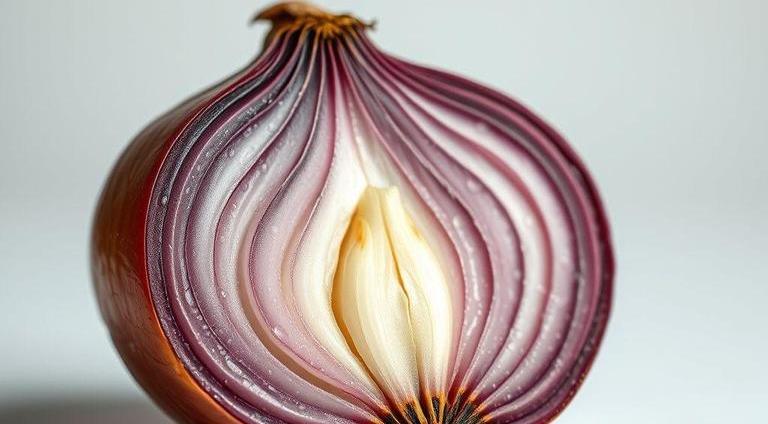- You are here:
- Home »
- Food Shelf Life
- » Can Onion Go Bad : What You MUST Know
Can Onion Go Bad : What You MUST Know
Onions are a staple ingredient in kitchens around the world. Whether you’re using them to add flavor to a savory dish, making a delicious onion soup, or even just using them as a garnish for salads, they are undeniably versatile. But as with most food items, you might wonder: how long can onions stay fresh, and when do they go bad?
Spoiling can sneak up on onions, especially since they don’t come with a built-in expiration date. Knowing how to store them, recognizing the signs of spoilage, and understanding their shelf life can help you avoid waste and make sure your onions are at their peak when you use them.
Let’s break down everything you need to know about onions, including how to store them properly, how to tell when they’ve gone bad, and tips for extending their shelf life.
Can Onion Go Bad?
Yes, onions can absolutely go bad, and they don’t stay fresh forever. Onions are particularly sensitive to their environment, and when stored improperly or kept for too long, they begin to deteriorate. The problem is that onions don’t have a visible expiration date like a carton of milk or a bag of chips. Instead, they gradually lose their flavor, texture, and appearance, and if they spoil completely, they can develop mold or an unpleasant smell.
There are several factors that influence how long onions last:
- Type of Onion: There are many varieties of onions-yellow, red, white, green onions, shallots-and each has a slightly different shelf life.
- Storage Conditions: How and where you store onions can significantly affect how long they last.
- Time of Harvest: Freshly harvested onions can last longer than onions that have already been sitting on a shelf for a while.
Shelf Life For Onion

The shelf life of onions depends on a few factors, such as the storage method, whether the onion is whole or cut, and the environment around it.
-
Whole Onions: If you store whole, unpeeled onions in the right conditions, they can last quite a while.
- Room Temperature: Onions can stay fresh for about 2 to 3 months when stored in a cool, dry, and well-ventilated place. Avoid putting them near potatoes because they release moisture and gases that can cause each other to spoil faster.
- Refrigeration: It’s not recommended to refrigerate whole onions because the humidity in the fridge can cause them to sprout or spoil faster.
- Storage Containers: A wire basket, mesh bag, or a well-ventilated crate works best for onions to keep air circulating and prevent them from rotting prematurely.
-
Cut Onions: Once an onion has been cut, its shelf life dramatically shortens.
- Refrigeration: A cut onion can last about 7 to 10 days in the refrigerator, as long as it’s properly sealed in an airtight container or wrapped tightly in plastic wrap.
- Freezing: You can freeze chopped onions if you don’t think you’ll use them in time, and they can last up to 6 months in the freezer, though their texture may change once thawed.
Common Signs Of Spoilage
Sometimes it’s tricky to tell if your onion has gone bad, especially when it’s stored in a dark place. But there are a few telltale signs that your onion might be spoiled:
- Softness and Mushiness: Fresh onions should feel firm to the touch. If you notice that your onion is soft, squishy, or has noticeable spots that feel mushy, it’s a clear sign of spoilage.
- Discoloration: While onions do have a variety of colors, they should maintain a consistent hue. If you see patches of discoloration, especially if they are brown or black, this means the onion is starting to rot.
- Foul Odor: Onions should have a sharp, slightly sweet, or savory smell. If an onion begins to smell sour, moldy, or rancid, it’s no longer good to eat.
- Sprouting: While sprouting is not necessarily a sign that an onion is inedible, it does indicate that it’s no longer at its freshest. The onion may still be edible, but it’s best to remove the green sprouts and use the onion sooner rather than later.
- Mold: If you notice mold growth on the outer layers of the onion, it’s definitely gone bad. Mold can develop more quickly if the onion is stored in a humid or moist environment.
How To Store Onion?

Proper storage is key to extending the shelf life of your onions and ensuring they stay fresh as long as possible. Here are some methods and tips for storing onions correctly:
Whole, Unpeeled Onions
- Cool, Dry, and Dark Place: The ideal temperature for storing onions is around 45-55°F (7-13°C). A pantry or a dark cabinet is often the best place for onions.
- Ventilation: Onions need to breathe, so avoid sealing them in plastic bags. Instead, store them in a mesh bag, wire basket, or perforated container to allow air circulation.
- Avoid Light and Moisture: Light can cause onions to sprout, while moisture can lead to mold. Keep your onions in a dry, cool environment.
Cut Or Peeled Onions
- Refrigerator: If you’ve already cut or peeled your onions, they should be stored in the fridge. Place them in an airtight container or wrap them tightly in plastic wrap or foil.
- Use within 7-10 Days: Cut onions should ideally be consumed within 1 week to avoid spoilage.
Freezing Onions
- Prep Before Freezing: Before freezing onions, chop them into your desired size. Blanch them for about 2 minutes in boiling water to preserve their flavor and texture, then let them cool and freeze in airtight containers.
- Long-Term Storage: Frozen onions can last up to 6 months, though they may lose some of their crispness when thawed.
Expert Tips
- Check Your Onions Regularly: When storing onions, especially in bulk, make it a habit to check them every few days for signs of sprouting or spoilage. The earlier you catch it, the less waste you’ll have.
- Keep Onions Away from Potatoes: Both potatoes and onions release gases that can speed up the ripening and spoiling process. Store them separately to maintain freshness longer.
- Use a Ventilated Basket or Mesh Bag: When onions are stored in a basket with ventilation, they last much longer because they aren’t trapped in moisture.
- Don’t Refrigerate Whole Onions: While you might be tempted to store whole onions in the fridge, this causes them to go soft faster. Only store peeled or cut onions in the fridge.
- Try Curing Your Onions: If you’ve harvested onions from your garden, you can cure them by leaving them in a warm, dry place for a week or two before storing them. This helps harden their outer skin, making them last longer.
FAQs
Can Onions Go Bad If Not Stored Properly?
Yes, onions can go bad if they are not stored in a cool, dry place with proper ventilation. Storing them in a damp or warm environment encourages the growth of mold and bacteria, leading to spoilage.
How Long Do Onions Last Before They Go Bad?
Unpeeled, whole onions can last up to 2-3 months when stored in a cool, dry place. Once peeled or cut, onions should be used within 7-10 days if refrigerated.
Can Onions Go Bad In The Fridge?
Yes, onions can go bad in the fridge, but they last longer when refrigerated. Whole onions should be stored in a well-ventilated area, while cut onions should be placed in an airtight container in the fridge to prevent them from absorbing moisture and odors.
What Signs Indicate An Onion Has Gone Bad?
Signs of a bad onion include a soft, mushy texture, discoloration (especially black spots), a foul or rotten smell, sprouting green shoots, or mold growth on the outer skin.
Can You Still Eat An Onion That Has Sprouted?
Yes, you can eat an onion that has sprouted, but the flavor may be milder, and the texture can be slightly tougher. You can also remove the sprouted green shoots if preferred.
How Should You Store Onions To Prevent Them From Going Bad?
Store onions in a cool, dry place away from direct sunlight, preferably in a ventilated area like a pantry or onion basket. Avoid storing them in plastic bags, as they can trap moisture and cause them to rot.
Can Onion Skins Be Used After The Onion Has Gone Bad?
No, once the onion has gone bad, its outer skins are no longer safe to use. They can harbor mold, bacteria, or other pathogens that could cause foodborne illness.
Can I Freeze Onions To Make Them Last Longer?
Yes, onions can be frozen, but they should be chopped first and blanched to preserve texture and flavor. Freezing whole onions is not recommended as their texture can deteriorate once thawed.
What Happens If You Eat A Bad Onion?
Eating a bad onion can cause food poisoning symptoms like nausea, vomiting, stomach cramps, and diarrhea, especially if the onion has mold or bacteria. Always check for signs of spoilage before consuming.
How Can I Tell If A Bagged Onion Is Bad Without Opening It?
If the onion is in a bag, check for any visible signs of moisture or mold on the outside of the bag. The onion should feel firm to the touch; if it’s soft or squishy, it has likely gone bad.
